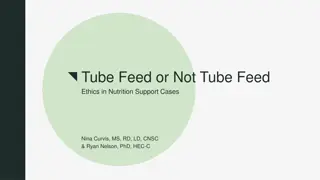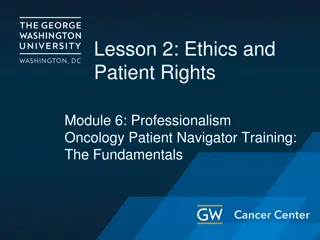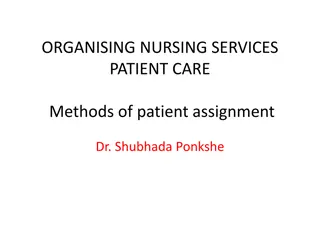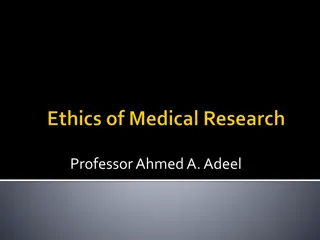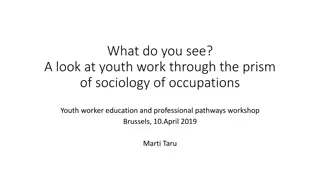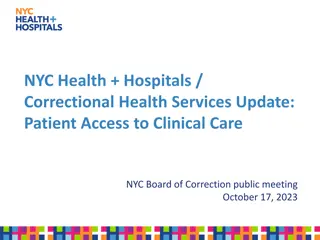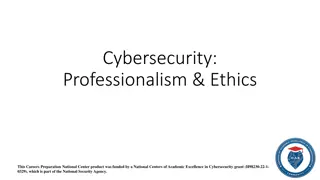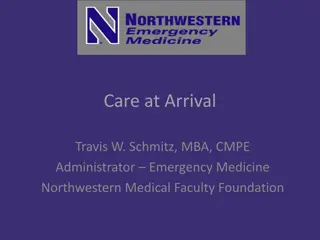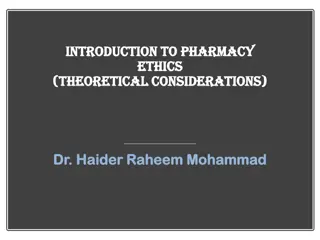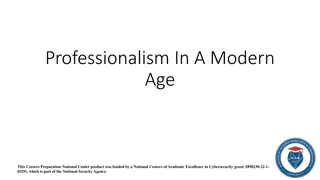Professionalism and Ethics in Medical Practice: Key Concepts and Impact on Patient Care
Understanding the core concepts of professionalism and ethics in medical practice is essential for healthcare providers. Professionalism involves a commitment to ethical principles, accountability, excellence, and cultural sensitivity. It directly impacts the patient-physician relationship, influencing patient satisfaction, trust, and adherence to treatment. Ethics codes guide medical professionals in making sound decisions and upholding moral standards. Enhancing professionalism in clinical settings requires a supportive educational and working environment that fosters integrity and compassion.
Download Presentation

Please find below an Image/Link to download the presentation.
The content on the website is provided AS IS for your information and personal use only. It may not be sold, licensed, or shared on other websites without obtaining consent from the author. Download presentation by click this link. If you encounter any issues during the download, it is possible that the publisher has removed the file from their server.
E N D
Presentation Transcript
Oral Exam Preparation Part (3) Dr Mohamed Salem Assistant Professor Family Medicine Weill Cornell Medical college
Arab Board Exam Requirements Urgent care Professionalism Decision making Evidence based medicine Administration and leadership Ethics Cost effectiveness Self development Preventive services
Objectives Professionalism What is the definition of professionalism? How does professionalism affect the patient-physician relationship? Can professionalism be changed? How does the educational and working environment influence professionalism? Regarding resident professionalism, what should I look for? Ethics What is the definition of medical ethics? Mention the ethics codes you know ? What are the ethics principles? Decision making
Definition of Professionalism : It is a commitment to carrying out professional responsibilities, adherence to ethical principles, and sensitivity to a diverse patient population.
Elements of professionalism : Respect, compassion, and integrity Responsiveness to the needs of patients and society that supersedes self -interest Accountability to patients, society, and the profession Commitment to excellence and on-going professional development. Commitment to ethical principles pertaining to provision or withholding of clinical care, confidentiality of patient information, informed consent, and business practices Sensitivity and responsiveness to patients culture, age, gender, and disabilities
How does professionalism affect the patient-physician relationship? Professionalism is related to patient satisfaction. Patients are more likely to be satisfied with physicians who behave professionally. Patients are more likely to follow through with treatment recommendations when they trust their physician Patients say they are more likely to stay with physicians they perceive as behaving professionally and are likely to recommend these physicians Most patient complaints about physicians involve physicians unprofessional behavior. Patients are more likely to bring legal action against physicians they perceive as behaving unprofessionally than other physicians. Evidence suggests a relationship between physician excellence and professionalism
How does the educational and working environment influence professionalism? The educational environment, whether through formal or informal curricula, appears to influence learner attitudes and behavior. Residents reported learning most about professionalism from observing role models Regarding your professionalism, what should you look for? Thorough and careful in completing patient care tasks know the limits of abilities and ask for help when appropriate Help or fill-in for others Respectful in his or her interactions with colleagues and other health care professionals
Ethics What is the definition of medical ethics? "Medical Ethics is a practical discipline that provides a structured approach to the analysis of ethical issues in clinical medicine & research." A. Jonsen, M. Siegler, W. Winslade. Clinical Ethics 4th Ed. (1998) Mention the ethics codes you know ? The international codes of medical ethics: codes of medical ethics Declaration of Geneva in 1948 (WHO). Nuremberg Code (1950) Declaration of Helsinki (1964) Belmont report (1979).
What are the ethics principles? 1. Autonomy (respecting the patient's wishes): the duty to protect and foster a patient's free, uncoerced choices. From the principle of respect for autonomy are derived the rules for informed consent, confidentiality, truth- telling and disclosure. 2. Beneficence: the duty to promote good and act in the best interest of the patient and the health of society. 3.Nonmaleficence: the duty to do no harm to patients. 4. Justice : in resources allocation, treatment and care 5. Confidentiality
Decision Making An 86 years old lady presenting with her first attack of epilepsy. The investigations proved a brain tumor (meningioma 1cm). The neurosurgeon advised brain surgery. Her elderly son is a doctor and was asking an ethical decision advice as he wants to omit her the troubles of surgery at her age at the same time he needs to do what is in her best interest.
Review of the Medical Facts. Facts : - slowly progressive lesion- not life threatening - she is likely to be kept on antiepileptic drugs for life after surgery. - The hazards of the operation at her age. - Sequel: she might be left hemiplegic- in any situation she will need help and continuous attention. Is she competent? Her family preferences. The pressure from the surgeon. Options : Operate or not.
Identification of ethical dilemma (Patient (or family) preferences (autonomy) against the doctor's code of duty. Is it a futile treatment? What are the patient's best interest. Ethical Principals promoted or violated in the decision Rights ( autonomy) Duty (respect her best interest) here is a conflict between family preferences and surgeon's point of view. - Actions available (complete disclosure) Consequences (end) Virtue (surgeon: Help, Duty and Responsibility.) Virtue (Family: Do no harm, keep her in peace & at the same time offer her the best chance for cure) Conflict between patient and family preferences and surgeon's interest Choices: Effect of the proposed courses of action in the overall well-being of the patient (patient s best interest). Legal and socio-cultural context. (Codes: duty, help, beneficence).
Clinical Cases in Medical Cases 1- A competent 30 year-old patient who is 38 weeks' pregnant reuses to have a caesarean delivery despite the fact that without the surgery the foetus will probably die. Both her physician and a consultation-liaison psychiatrist have failed to convince her to have the surgery. The most appropriate action for her physician to take at this time is to: (A) get permission from the patient's husband to do the surgery (B) ask a judge to issue a court order to do the surgery (C) tell the patient that she can be criminally prosecuted if the child dies (D) deliver the child vaginally (E) refer the patient to another doctor
D. The most appropriate action for the physician to take is to deliver the child vaginally. Competent pregnant women, like all competent adults, can refuse medical treatment, even if the fetus will die as a result. Neither the patient's husband (even if he is the father) nor the court has the right to alter this decision. Trying to frighten the patient by telling her that she can be criminally prosecuted if the child dies or referring her to another doctor are not appropriate actions.
2- A 19-year-old man who is HIV-positive tells his physician that he is regularly having unprotected sex with his 18-year- old girlfriend. The girlfriend does not know the patient's HIV status. At this time his physician should (A) inform state health authorities about the patient's HIV status (B) keep the information about the patient's HIV status confidential (C) inform the girlfriend of the patient's HIV status (D) inform the girlfriend's parents of the patient's HIV status (E) advise the girlfriend not to have unprotected sex with the patient
C. The physician should inform the patient's girlfriend (but not her parents) about his infection.The usual standards of doctor-patient confidentiality do not apply here since the patient's failure to use condoms poses a significant threat to his girlfriend's life (Tarasoff decision). If the patient is using condoms, the doctor does not have to inform his partner of his HIV-positive status.However, even if he is using condoms, the doctor should encourage the patient to disclose his medical condition to his sexual partner. Not all states require reporting of HIV-positive patients.
3- A 15-year-old patient who has contracted chlamydia consults her family physician. Prior to treating her infection, the physician should (A) notify her parents (B) notify her sexual partner (C) get written permission from her parents (D) counsel her on safe sex practices (E) report the case to state health authorities
D. Prior to treating the patient, the physician should counsel her on safe sexual practices. There is no need to break doctor-patient confidentiality by telling the sexual partner since chlamydia is not life-threatening. Parental consent is not required for treating minors in cases of sexually transmitted disease, pregnancy, and substance abuse. Chlamydia is not generally "reportable "to state health authorities.
4- A clearly competent 50-year-old woman who has religious beliefs that preclude blood transfusion is scheduled for major surgery. Prior to the surgery, she state. that the physician is not to give her a blood transfusion, Plthough she may need it during surgery. If a transfusion becomes necessary during surgery, the physician should (A) replace lost body fluids but not give the woman the transfusion (B) get a court order to do the transfusion (C) get permission from the woman's family to do the transfusion (D) give the woman the transfusion but not tell her about it (E) give the woman the transfusion and inform her of it when she recovers from the anesthetic
A. The physician can use alternative means of replacing lost body fluids but should not give the patient a blood transfusion. Legally competent patients may refuse treatment even if death will result. Getting a court order or obtaining permission from the woman's family to do the transfusion are not appropriate or ethical actions. Failing to tell a patient the truth, (i.e., giving the woman the transfusion but not telling her about it), or going against a competent patient's expressed wishes (i.e., informing her of the transfusion when she recovers from the anesthetic),are never appropriate.
5- A 30-year-old man and his 10-year-old son are injured in a train crash. Both of them need surgery within the next 12 hours. The father is clearly mentally competent but refuses the surgery for both himself and his son. The physician should (A) get a court order for the surgery on the child but do not operate on the father (B) get a court order for the surgery fe both the father and child (C) get permission for the surgery for both the father and child from the mother (D) have the father moved to another hospital (E) follow the father's wishes and do not operate on either the father or the son
A. As noted above, a patient who is legally competent can refuse lifesaving treatment for himself for religious or other reasons, even if death will be the outcome. However, a parent (or guardian) cannot refuse lifesaving treatment for his child for any reason. When there is time, a court order should be obtained before treatment is started. In an emergency, the physician can proceed without a court order. Competent patients (i.e., the father) can refuse treatment for themselves even if death or injury will result.
6- A 60-year-old man has a suspicious mass biopsied. He is clearly mentally competent but has been very depressed over his wife's recent death. His daughter asks the doctor not to tell the patient the diagnosis if the results show a malignancy because she fears that he will kill himself. If the mass proves to be malignant, the doctor should (A) follow the daughter's wishes and not tell the patient the diagnosis (B) tell the patient the diagnosis immediately (C) tell the patient not to worry and that he will be well cared for (D) ask the patient when he would like to receive the diagnosis (E) have the daughter tell the patient the diagnosis
D. Before this patient's cancer can be treated, he must be informed of the diagnosis. Since there is some question about his emotional state, asking the patient when he would like to receive the diagnosis is the best choice. Only the doctor (not a family member) should tell the patient the results of a medical test. If the doctor believes that the patient's health will be adversely affected by the news of a malignancy, she can delay telling the patient the diagnosis until he is ready to receive the biopsy report. The opinions of family members as to whether to tell the patient the diagnosis and prognosis are not relevant.
7- A 10-year-old boy who was injured during gym class is brought to the emergency department. He has a severe laceration that requires immediate suturing. His parents are on vacation and cannot be located and an aunt is babysitting for the child. The most appropriate action for the physician to take is to (A) obtain consent from the aunt (B) obtain consent from the gym teacher (C) suture the laceration without obtaining consent (D) keep the patient comfortable until you reach the parents (E) obtain consent from the child himself
C. Only the parent can give consent for surgical or medical treatment of a minor. In an emergency such as this, if the parent or guardian cannot be located, treatment may proceed without consent. The babysitting aunt and gym teacher have no legal standing to make health care decisions for this child. Waiting to act until the parents are reached could be harmful to the child.
8- On his surgery rotation, medical student X frequently smells alcohol on the breath of medical student Y The most appropriate action for medical student X to take is to (A) talk to medical student Y about his drinking on the floor (B) warn medical student Y that he will be reported if he continues to drink on the floor (C) report medical student Y to the dean of students (D) report medical student Y to the police (E) ask that medical student Y be transferred to another rotation site
C. The most appropriate action for medical student X to take is to report medical student Y to the dean of students. Reporting of an impaired colleague is required ethically because patients must be protected and the impaired colleague must be helped. Even if medical student X talks to or warns medical student Y about his drinking, there is no guarantee that Y will listen and that the patients will be protected. Reporting Y to the police is not appropriate.
9- A surgeon to whom an internist has regularly referred patients tells the internist in confidence that he (the surgeon) is HIV positive. The most appropriate action for the internist to take is to (A) stop referring patients to the surgeon (B) report the surgeon to the state health authorities (C) report the surgeon to the hospital administration (D) continue to refer patients to the surgeon (E) continue to refer patients to the surgeon but first tell them about his HIV status
D. The most appropriate action for the internist to take is to continue to refer patients to the surgeon without mentioning his HIV status, provided that the surgeon is physically and mentally competent to treat patients and he complies with precautions for infection control. Physician-to-patient transmission of HIV has never been confirmed in the United States. Doctors are not required to inform either patients or the medical establishment about another doctor's HIVpositive status.
10- A 25-year-old man who is HIV-positive comes to a doctor's office for treatment of a skin lesion. Because she is afraid of infection, the doctor refuses to treat him. This doctor's refusal to treat the patient is best described as (A) unethical and illegal (B) ethical and legal (C) unethical but legal (D) ethical but illegal
C. It is unethical but not illegal for doctors to refuse to treat patients because of fear of infection.
11- A clearly competent, pregnant 25-year-old woman tells her obstetrician that over the past year she has abused intravenous drugs and has had at least 10 sexual partners. The doctor suggests that she be tested for HIV but she refuses. The most appropriate action for the doctor to take is to (A) perform the test without the patient's knowledge (B) give her a prescription for zidovudine (AZT) (C) refer her to another obstetrician (D) note in her chart that she has refused to be tested and continue caring for her (E) ask the father of the child for permission to test the patient
D. The most appropriate action for the doctor to take is to note in the patient's chart that she has refused to be tested and continue to care for her. Although providing zidovudine (AZT) to an HIV-positive woman during pregnancy can significantly reduce the danger of HIV transmission to the unborn child a pregnant woman has the right to refuse medical tests or treatment even if the fetus will die or be seriously injured as a result.
12- A married 17-year-old woman sustains brain damage after an unsuccessful suicide attempt. She is in a coma and requires life support. Clinical examination and electroencephalogram (EEG) reveal irreversible cessation of brain function. Her father insists that the physician not withdraw life support. The most appropriate action for the doctor to take is to (A) withdraw life support (B) do nothing (C) get a court order to withdraw life support (D) get the patient's husband to authorize withdrawal of life support (E) get the patient's mother to authorize withdrawal of life support
A. The most appropriate action for the doctor to take is to withdraw life support. If a patient is legally dead ("brain dead"), the physician is authorized to remove life support without a court order or consent from family.
13- A 55-year-old woman undergoes surgery to repair a torn knee ligament. After the surgery, she has partial paralysis of the affected leg and sues the surgeon for malpractice. The lawsuit will be successful if the patient can prove that (A) the physician did not follow the usual standards of professional care (B) the paralysis is permanent (C) the physician was not board-certified in orthopedic surgery (D) her sexual function is negatively affected by the paralysis (E) she will lose a significant amount of time from work because of the paralysis
A. The lawsuit will be successful if the patient can prove that the physician did not follow the usual standards of professional care. An unfavorable outcome alone (e.g., paralysis of the leg as an unavoidable complication of the surgical procedure) or negative effects on functioning because of the injury do not constitute malpractice. Licensed physicians are legally allowed to perform any medical or surgical procedure; they do not have to be boarded in a specialty.
14- A 35-year-old man who has paranoid type schizophrenia and lives in a subway station is brought to the emergency department. This patient can be hospitalized against his will if he (A) is dirty and disheveled (B) is malnourished (C) has attempted to push a passenger onto the train tracks (D) is hearing voices (E) believes the FBI is listening to his conversations
C. This patient can be hospitalized involuntarily if he poses a significant danger to himself or to others. Trying to push a passenger onto the tracks is such a danger. Self-neglect (e.g., poor grooming, malnutrition) or psychotic symptoms (e.g., hearing voices or having delusions-see are not grounds for involuntary hospitalization unless they constitute a significant,i mminent danger to this patient's life.





